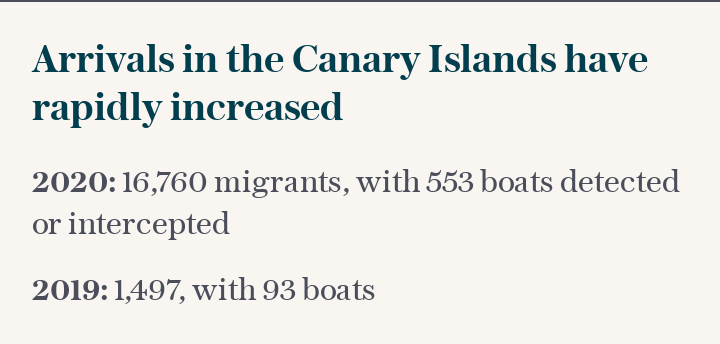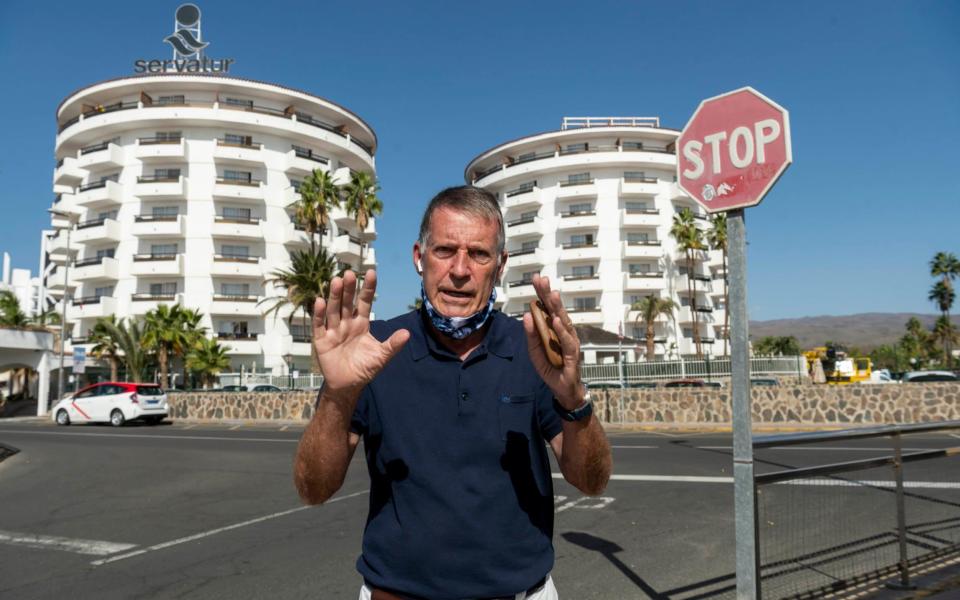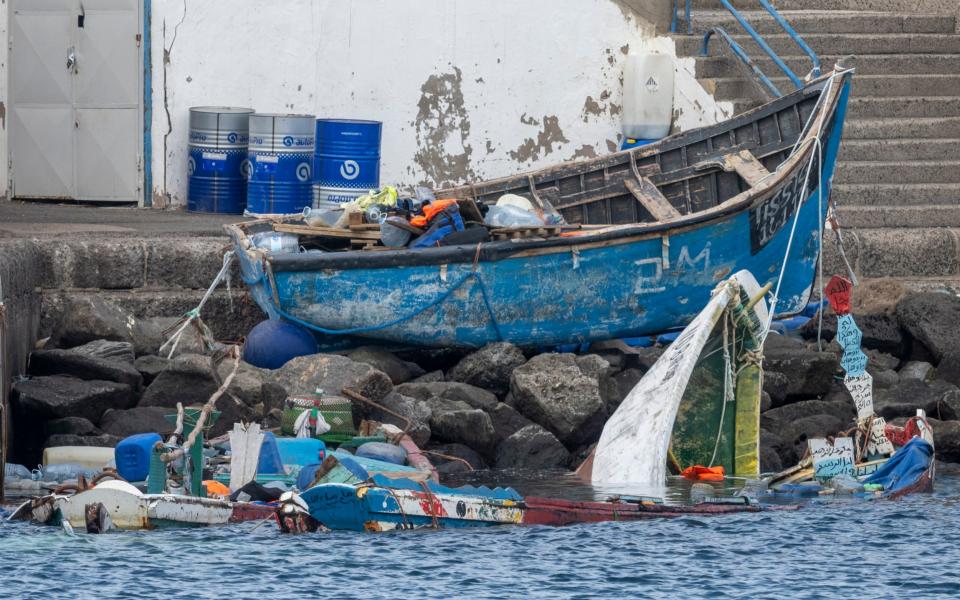Tensions rise on Canary Islands as thousands of migrants seek new route into EU

Peering down from their balconies at the luxury Waikiki hotel, more than a thousand migrants gaze out towards the sea that carried them on their desperate journey fleeing Africa.
Their rickety fishing boats lie piled up on docksides waiting to be scrapped. Smashed hulls still bob in the water, a reminder of the eight lives claimed this week off Lanzarote as hundreds more migrants reached Spain’s Canary Islands.
The survivors’ safety in hotel accommodation amid the sprawling resorts of southern Gran Canaria is testament to local islanders’ proud benevolence.
But generosity is running thin as tempers fray amid a growing crisis that has split Canarian leaders from their mainland colleagues, and reopened old wounds in Europe's hopeless attempt to control migration.
The Canary Islands has seen arrivals increase tenfold in a year to around 20,000 by late November. Plans are now afoot to build one of Europe's largest migrant camps, housing 7,000 across three islands.
Around 6,000 are currently living in 15 hotel complexes after a deal was struck between hoteliers and the Spanish government.

Tom Smulders, a hotel owner and vice-president of the local hotelier association said the move had been a magnificent gesture which has been handled badly. He argues that migrants should be in empty apartments of bungalows, not four star hotels.
Covid has, of course, hammered the local economy on the islands, and as tourism high season arrives hotel occupancy hovers at the pitiful level of 7.5 per cent on Gran Canaria.
“This is the image we wanted to avoid,” sighed MrSmulders, standing in front of the four-star Waikiki as operators use a crane to remove the name of hotel company SuneoClub from the roof of one of the complex’s five towers.
He added: “Now tourists are arriving at the airport and asking their tour operators if they will be sharing their hotel with migrants, something which we have agreed in the sector will never happen.”
Before being placed in hotels migrants are processed at cramped dockside camp that Spain’s ombudsman and local campaigners have described as “inhuman”.
The Arguineguín camp was built by the Red Cross for 400 people but has housed more than 2,000 at times over recent months. Many blame the Spanish government for not taking the migrants to the mainland, where they want to start a new life.

“This camp exists because the Spanish government is unable to deal with this immigration crisis,” said local mayor Onalia Bueno, who told The Telegraph that she had seen rodents on the quayside where migrants sleep “on the hard floor” and have developed scabies due to the lack of hygiene.
The situation is stirring deep anger amongst locals in a town that would usually be bustling with tourists at this time of year but which this year is shrouded in silence.
Juan Ramón Trujillo, a 42-year-old fisherman from Arguineguín, said he had joined recent demonstrations against the presence of the camp, which sparked fears of a growth of extremist anti-immigration as espoused by the far-Right party Vox.
“We are not against the migrants. They are human beings and they are being kept worse than dogs,” Mr Trujillo said..
“Putting them in hotels is not right. Hotels are for tourists. The word will spread and more will come. If they don’t have legal papers, they should be put in centres and sent home,” said Bernardo Santiago, sitting by the dock because he cannot find work as a waiter this year.
“If this sounds like Vox’s policies, then so be it. It’s just common sense, whoever says it.”
Despite Spain’s interior minister, Fernando Grande-Marlaska, warning earlier in the month that transferring migrants to the mainland would create a “pull effect”, Spain has quietly shipped and flown 2,000 from the Canaries to Madrid and other cities, a government source told The Telegraph.

Prime Minister Pedro Sánchez this past week pleaded with northern EU member states for greater solidarity, including a quota-based distribution of asylum-seekers and policies allowing for legal migration.
“We are not going to make a Moria in the Canaries. That is not our style,” said Hana Jalloul, Spain’s secretary of state for migration, in reference to the notoriously overcrowded camp on Lesbos that finally burned to the ground two months ago.
René Camara, an 18-year-old who escaped from violence in Guinea after two of his brothers were killed, is among those receiving humanitarian assistance in the Servatur Puerto Azul hotel in Gran Canaria.
“I only want to feel protected in Spain,” Mr Camara told The Telegraph, adding that he had not yet been able to request asylum two months after a 10-day crossing in a fishing boat for which he paid $900.
“There were 52 people on board. For the last two days there was no food and water; three people had to go to hospital when we arrived.”
In the Santa Brígida centre for unaccompanied immigrant minors, of whom there are more than 2,000 in the Canary Islands compared to 540 in January, 13-year-old Adama recalls in whispered French how he felt “very frightened” on the 11-day sea crossing that brought him from Senegal. “I want to help my family. I am going to learn Spanish and become a mechanic.”

In the same hilltop building of faded elegance overlooking the city of Las Palmas, 15-year-old Baolé explained how he had conspired with his elder half-brother to secret him out of Mali without their parents knowing.
“They were very angry when I phoned from Spain. But Mali is a lawless place. If you make some money, you will probably be killed for it, and the police won’t even investigate,” he said, explaining that he is into IT and would like to work in law enforcement.
Others admit that they took a gamble on the Atlantic waves purely to improve their economic situation.
Moodo Malick Kâ, a 25-year-old from M’bour in Senegal, is a married man with a one-year-old son, but he travelled alone on a crowded pirogue canoe-style boat with 128 others to change his family’s fortunes.
“I sold a little land that I had to pay for the crossing. With what I earned as a porter and salesman I was never going to be able to build a house on it.
My wife wished me luck and good courage. I am prepared to give up my life for my family; all I want is a good job and I don’t care what country it is in.”

 Yahoo News
Yahoo News 
